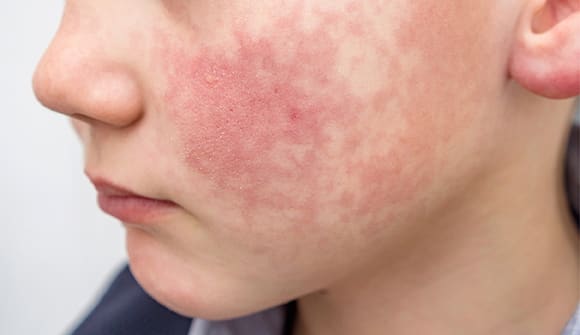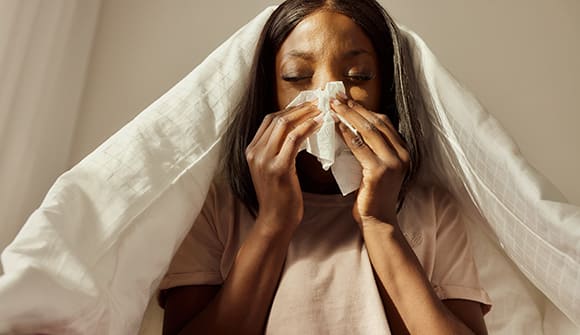Facts about fifth disease
Cases of ‘slapped-cheek’ sickness on the rise.
Article Author: Juliette Allen
Article Date:

With the school year underway, parents expect their children to bring home colds and coughs with their notebooks and homework. Just when you think your child has recovered, a rash emerges throughout their body, but it’s their cheeks that tell the story.
“Human parvovirus B19 is also known as ‘slapped-cheek disease’ because of the distinctive bright red rash on the cheeks,” said Shalika Katugaha, MD, system director of Infectious Diseases for Baptist Health.
Three names, one virus: symptoms of fifth disease
The Centers for Disease Control and Prevention (CDC) recently issued a health advisory about a rise in cases of human parvovirus B19, also known as “fifth disease,” because historically it was No. 5 in a list of common childhood illnesses characterized by a rash. According to Dr. Katugaha, the virus is common among young children and spreads through respiratory droplets from coughing, sneezing or getting an infected person’s saliva in the mouth, nose or eyes.
Though the rash is the telltale sign of parvovirus B19, the rosy cheeks occur in the second phase of the illness and signal the child is no longer contagious.
The first, infectious phase of the illness often lasts around five days. Symptoms in children may include:
- Headache
- Fever
- Runny nose
- Upset stomach
Once these symptoms subside, the rash appears and lasts seven to 10 days, though it may come and go for up to three weeks and be more noticeable in heat or sunlight.
“It may be itchy and can spread to the arms, legs, abdomen, thighs and buttocks and may look ‘pink and lacy,’ meaning it has a slightly raised appearance,” Dr. Katugaha said.
Adults who get parvovirus B19 typically don’t develop the slapped-cheek rash. Instead, they often experience joint soreness in the hands, wrists, knees and ankles.
The good news? Most people were exposed to parvovirus B19 in early childhood, and once you get it, you’re immune for life.
Blood disorders, pregnancy and parvovirus
For both adults and children, treatment is usually to relieve symptoms until the virus clears. However, certain people are at higher risk for severe illness.
- Pregnant women: The virus can spread from mom to baby in the womb, leading to anemia (low red blood cells) in the developing fetus. According to Dr. Katugaha, parvovirus infection during early pregnancy can cause a slight increase in risk of miscarriage.
- People with weakened immune systems or blood disorders like sickle cell disease: Parvovirus can alter red blood cell production and cause low blood count.
“Most generally healthy people have mild symptoms and will be fine,” Dr. Katugaha said. “Those at greater risk due to pregnancy or immunocompromised status should be more vigilant and careful. You can reduce your chance of getting parvovirus by washing your and your child’s hands often, not touching your face, cleaning frequently touched surfaces like doorknobs, and avoiding contact with others who are sick.”
She added, “While there’s certainly no reason to panic about parvovirus B19, the more awareness in the public and in parents about this respiratory virus, the better we as a community can manage it.”
As cold and flu season approaches, you and your family need a primary care physician you can count on. To find the right provider for you, call 904.202.4YOU (4968) or fill out the appointment request form.
Reference: CDC Health Advisory



